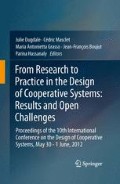Abstract
It is a feature central to cooperative work that practitioners develop and maintain their collective competences and skills, and one will in many settings find elaborate didactic practices that reflect this state of affairs. The concept of ‘knowledge transfer’ that plays a key role in the knowledge management research area offers an obvious framework to the study of mutual learning. However, the notion of ‘knowledge transfer’ is a semantic pathology despite its widespread use in academia and everyday language, or more precisely, it is a conduit metaphor that mystify the very concept of didactic practice. The argument is that we need to abandon the conduit metaphor all together and present a viable alternative. In this paper we suggest that talking about ‘didactic practice’ is one such alternative and substantiate this assertion by presenting an ethnographic study of didactic practice in the building process.
Access this chapter
Tax calculation will be finalised at checkout
Purchases are for personal use only
Notes
- 1.
A search on ‘knowledge transfer’ in the ACM Digital Library (http://dl.acm.org/) returns no fewer than 18,307 results (on December 8, 2011).
- 2.
A search on “knowledge transfer” in Google Scholar (http://scholar.google.com/) returns no fewer than 102,000 results (on December 8, 2011).
- 3.
KBK is the acronym for a subcontractor that was responsible for some elements of the roof construction.
- 4.
Roofing felt’ is also sometimes referred to as ‘asphalt roofing’.
References
Alavi, M., Leidner, D.: Knowledge management and knowledge management systems: conceptual foundations and research issues. MIS Q. 25(1), 107–136 (2001)
Bansler, J., Havn, E.: Building community knowledge systems: an empirical study of IT-support for sharing best practices among managers. Knowl. Process. Manag. 10(3), 156–163 (2003)
Fitzpatrick, G.: Emergent expertise sharing in a new community. In: Ackerman, M., Pipek, V., Wulf, V. (eds.) Sharing Expertise: Beyond Knowledge Management, pp. 77–106. The MIT Press, Cambridge (2003)
Huysman, M., de Wit, D: A critical evaluation of knowledge management practices. In: Ackerman, M., Pipek, V., Wulf, V. (eds.) Sharing Expertise, pp. 27–57. The MIT Press, Cambridge (2003)
Huysman, M., Wulf, V.: IT to support knowledge sharing in communities: towards a social capital analysis. J. Inform. Technol. 21, 40–51 (2006)
McDermott, R.: Why information technology inspired but cannot deliver knowledge management. Calif. Manag. Rev. 41, 103–117 (1999)
Newell, S., Scarbrough, H., Swan, J.: From global knowledge management to internal electronic fences: contradictory outcomes of intranet development. Br. J. Manag. Learn. 12, 91–111 (2001)
Orlikowski, W.J.: Learning from NOTES: organizational issues in groupware implementation. In: Mantei, M.M., Baecker, R.M., Krau, R.E. (eds.) Proceedings of the Conference on Computer-supported Cooperative Work, 31 October–4 November 1992, Toronto, Canada, pp. 362–369. ACM Press, New York (1992)
Reddy, M.J.: The conduit metaphor: a case of frame conflict in our language about language. In: Ortony, A. (ed.) Metaphor and Thought. Cambridge University Press, Cambridge (1979)
Szulanski, G.: The process of knowledge transfer: a diachronic analysis of stickiness. Organ. Behav. Hum. Decis. Process. 82(1), 9–27 (2000)
Williams, M.: Wittgenstein, Mind and Meaning: Towards a Social Conception of Mind. Routledge, London (1999)
Wittgenstein, L.: Philosophical Investigations. Blackwell, Oxford (2001)
Acknowledgments
A warm thanks goes to the employees of PLH Arkitekter A/S as well as E. Pihl & Søn A/S for allowing me to take up so much of their time. In addition, the contributions of the anonymous reviewers are greatly appreciated.
Author information
Authors and Affiliations
Corresponding author
Editor information
Editors and Affiliations
Rights and permissions
Copyright information
© 2012 Springer-Verlag London
About this paper
Cite this paper
Christensen, L. (2012). The Trouble with ‘Knowledge Transfer’: On Conduit Metaphors and Semantic Pathologies in Our Understanding of Didactic Practice. In: Dugdale, J., Masclet, C., Grasso, M., Boujut, JF., Hassanaly, P. (eds) From Research to Practice in the Design of Cooperative Systems: Results and Open Challenges. Springer, London. https://doi.org/10.1007/978-1-4471-4093-1_8
Download citation
DOI: https://doi.org/10.1007/978-1-4471-4093-1_8
Published:
Publisher Name: Springer, London
Print ISBN: 978-1-4471-4092-4
Online ISBN: 978-1-4471-4093-1
eBook Packages: Computer ScienceComputer Science (R0)

